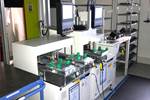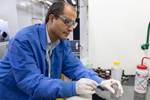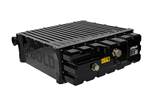Trinseo demonstrates DLFT, PC for electric vehicle battery packs
The DLFT production process enhances polycarbonate’s performance qualities through high thermal stability that next-gen battery packs demand.
Trinseo tested a 2.8-square-meter DLFT-reinforced PC battery top cover. Source | Trinseo Netherlands B.V.
(Terneuzen, The Netherlands), a specialty material solutions provider, highlights how combining direct long fiber thermoplastics (DLFT) molding and polycarbonate (PC) gives engineers and OEMs additional options when it comes to developing next-gen electric vehicles (EVs).
Protecting EV battery packs is crucial for vehicle durability and user safety. Metal has been the standard for encasing battery packs, but at the expense of adding weight and limiting design flexibility, impacting range, costs and production efficiency. Alternatively, the DLFT process — a combination of compounding and molding in a single step — increases energy and production efficiency while producing strong, lightweight, impact-resistant composite parts. Additionally incorporating PC with the continuous glass or carbon fiber reinforcement is said to leverage its performance characteristics versus other thermoplastic materials — including high strength and toughness, durability, fire resistance and recyclability.
Trinseo contends that PC is one of the most economically intrinsic fire-resistant polymers, while also being inherently resistant to corrosion and rust thanks to its amorphous and non-hygroscopic nature. The long fiber enhancements that are part of the DLFT process further increase its fire resistance, contributing to battery safety, and the specific integration of long glass fibers in the DLFT process address the notch-sensitive nature of PC, making it more impact resistant under various environmental conditions, thus protecting sensitive battery cells. In tests, the company has proven that a 2.8-square-meter, full-sized DLFT-reinforced PC battery top cover can withstand the GB 38031 bonfire test, ensuring that battery cells are well-protected under extreme conditions.
Trinseo reports that recycled PC streams reduce the need for virgin material, advancing sustainability targets. High-quality, post-consumer recycled PC also maintains performance even at high loadings. Trinseo offers advanced recycling technology that makes closed-loop recycling of DLFT parts possible.
This post is courtesy of the ┬╠├▒¤ÎĂŮ and AZL Aachen GmbH media partnership.
Related Content
-
The potential for thermoplastic composite nacelles
Collins Aerospace draws on global team, decades of experience to demonstrate large, curved AFP and welded structures for the next generation of aircraft.
-
Combining multifunctional thermoplastic composites, additive manufacturing for next-gen airframe structures
The DOMMINIO project combines AFP with 3D printed gyroid cores, embedded SHM sensors and smart materials for induction-driven disassembly of parts at end of life.
-
Plant tour: Collins Aerospace, Riverside, Calif., U.S. and Almere, Netherlands
Composite Tier 1’s long history, acquisition of stamped parts pioneer Dutch Thermoplastic Components, advances roadmap for growth in thermoplastic composite parts.






